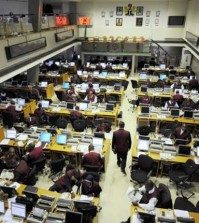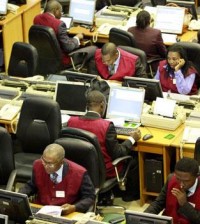Stakeholders seek early resolution of ‘trade alert’ contract crisis
STAKEHOLDERS in the nation’s capital market have decried lingering controversy trailing the trade alert contract, stressing the need on the part of the Nigeria Stock Exchange (NSE) to ensure its early resolution.
Already, the Independent Shareholders Association of Nigeria (ISAN) has concluded plans to petition the Security Exchange Commission (SEC), over alleged NSE’s foot-dragging in resolving the controversy.
AdonaiNet Nigeria Limited, owners and operators of trade alert services investors protection mechanism, had approached the Lagos High Court, over alleged breach of contract on the part of NSE, in its contract with the Exchange.
NSE was also alleged to have stopped remittance of AdonaiNet’s commission on trading activities on the stock exchange and the Central Securities Clearing System (CSCS), since December, 2010.
An AdonaiNet source, yesterday affirmed that the company has been discharging its duties in line with the contract terms, adding that NSE and other stakeholders, on a monthly basis, send data to the company for processing.
AdonaiNet also claimed that an order was given by the court, urging parties to maintain status quo before the dispute was referred to the arbitration panel. NSE, on the other hand, insisted that the court only advised all parties to respect an arbitration clause in the contract.
ISAN’s national coordinator, Sir Sunny Nwosu, however advised NSE to work towards early resolution of the crisis, stressing that the current delay was not in the interest of the nation’s capital market’s growth and development.
Nwosu said: “Without prejudice to whatever the arbitration panel would arrive at, the fact remains that the trade alert has helped the investing public in effectively monitoring trends in the market and has brought about credibility of the industry to the world.
“Before now, there were noticeable infractions, bothering on thefts and misinformation about sales of investors shares. These anomalies have been duly addressed by the trade alert mechanism.
“Indeed, but for the trade alert, the secondary market of the NSE would have collapsed during the capital market meltdown of 2008, because, stockbrokers would have easily sold off investors’ shares to fund their transactions, instead of resorting to margin loans.
“It will therefore not be in the interest of the investing public and the fragile investment climate in Nigeria for any regulator or authority to review the safety net mechanism and allow the system to slide back to the era of gargantuan infractions, which we all witnessed before the trade alert was introduced.”
The crisis over the trade alert system began when the Interim Administrator of NSE, Emmanuel Ikhazobor, on assumption of duties, summoned AdoniaNet for a meeting and suggested a review of the contract terms. NSE sources affirmed that the Exchange’s council, at its meeting on November 22, 2010, resolved to terminate the contract and moved that a new shareholders’ agreement with AdonaiNet be executed by all the parties.
But AdonaiNet insisted that it was wrong on the part of the new NSE’s management to terminate the agreement, as the scheme cannot be reviewed “before an initial period of 15 years, irrespective of a change of national government or management of the Nigerian Stock Exchange or CSCS.”
AdonaiNet also pointed out that “the conditions under which the agreement can be terminated are clearly stated in the pact and such conditions are not prevalent to warrant a termination.
“Even if the agreement is to be terminated, each party will give a 12-month notice and that the party in breach of the agreement will pay compensation and other incidental costs.”
As at yesterday, the arbitration panel was yet to be instituted, as The Guardian learnt that the constituent arbitrators, were yet to be fully constituted.
Contacted yesterday, NSE’s Senior Manager in charge of corporate affairs, Wole Tokede said the case was already before an arbitration panel.
Source : Guardian








